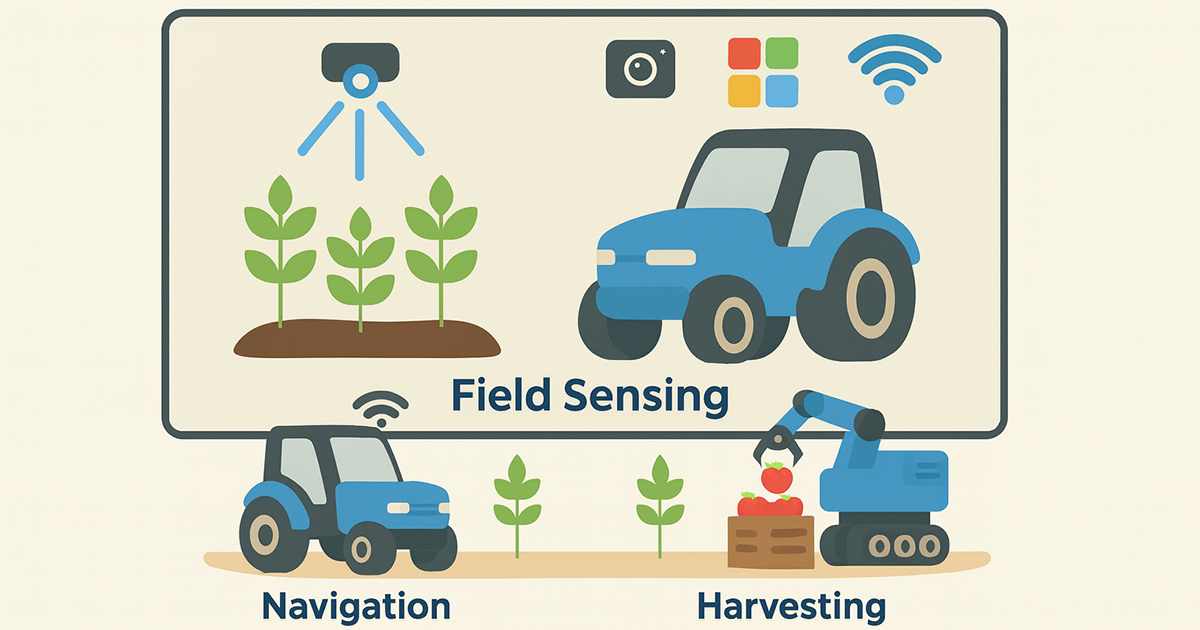AI-Powered Agricultural Robots: From Field Sensing to Autonomous Operation
A special issue of Agriculture (ISSN 2077-0472). This special issue belongs to the section "Agricultural Technology".
Deadline for manuscript submissions: 25 March 2026 | Viewed by 65

Special Issue Editors
Interests: AI-driven robotics; autonomous harvesting; multi-sensor fusion; precision agriculture; field phenotyping; digital twins
Special Issues, Collections and Topics in MDPI journals
Special Issue Information
Dear Colleagues,
The rapid integration of artificial intelligence (AI) into agricultural robotics has transformed how we monitor, analyze, and manage crop production. Traditional farming has relied heavily on manual labor and basic mechanization but advances in field sensing, computer vision, and machine learning have enabled robots to perform complex tasks with increasing precision and autonomy. Over the past decade, significant progress has been made in multi-modal sensing technologies—including RGB, multispectral, hyperspectral, LiDAR, and wearable plant sensors—combined with AI-driven decision-making to enhance crop monitoring and productivity.
This Special Issue focuses on cutting-edge research and practical innovations in AI-powered agricultural robots, spanning the entire pipeline from field sensing to autonomous operation. Topics of interest include robotic perception, multi-sensor fusion, crop phenotyping, real-time growth monitoring, precision harvesting, field navigation, and bio-feedback control systems. We are particularly interested in contributions that integrate deep learning, reinforcement learning, physics-informed models, and digital twin frameworks for robust, data-driven agricultural solutions.
We invite original research articles, reviews, and case studies that address innovations in robotics, AI algorithms, sensor integration, and autonomous systems for sustainable agriculture. Submissions demonstrating practical field deployments, simulation-to-real transfer, and cross-disciplinary advances are highly encouraged. This Special Issue aims to foster collaboration between researchers, practitioners, and industry experts to accelerate the adoption of next-generation AI-powered agricultural robotics.
Dr. Dugan Um
Dr. Thang Nguyen
Guest Editors
Manuscript Submission Information
Manuscripts should be submitted online at www.mdpi.com by registering and logging in to this website. Once you are registered, click here to go to the submission form. Manuscripts can be submitted until the deadline. All submissions that pass pre-check are peer-reviewed. Accepted papers will be published continuously in the journal (as soon as accepted) and will be listed together on the special issue website. Research articles, review articles as well as short communications are invited. For planned papers, a title and short abstract (about 100 words) can be sent to the Editorial Office for announcement on this website.
Submitted manuscripts should not have been published previously, nor be under consideration for publication elsewhere (except conference proceedings papers). All manuscripts are thoroughly refereed through a single-blind peer-review process. A guide for authors and other relevant information for submission of manuscripts is available on the Instructions for Authors page. Agriculture is an international peer-reviewed open access semimonthly journal published by MDPI.
Please visit the Instructions for Authors page before submitting a manuscript. The Article Processing Charge (APC) for publication in this open access journal is 2600 CHF (Swiss Francs). Submitted papers should be well formatted and use good English. Authors may use MDPI's English editing service prior to publication or during author revisions.
Keywords
- AI-driven robotics
- autonomous harvesting
- multi-sensor fusion
- precision agriculture
- field phenotyping
- digital twins
Benefits of Publishing in a Special Issue
- Ease of navigation: Grouping papers by topic helps scholars navigate broad scope journals more efficiently.
- Greater discoverability: Special Issues support the reach and impact of scientific research. Articles in Special Issues are more discoverable and cited more frequently.
- Expansion of research network: Special Issues facilitate connections among authors, fostering scientific collaborations.
- External promotion: Articles in Special Issues are often promoted through the journal's social media, increasing their visibility.
- Reprint: MDPI Books provides the opportunity to republish successful Special Issues in book format, both online and in print.
Further information on MDPI's Special Issue policies can be found here.






